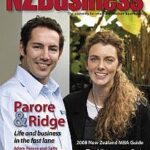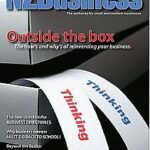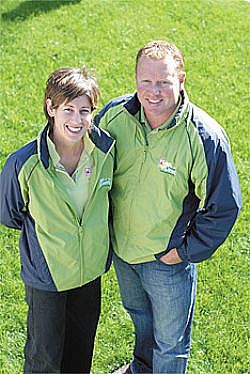Mind over matter
Are you cut out to be an SME business owner? If you are not made of the right stuff should you pack up now and go work for McDonald’s? Or are there ways to make the most of your natural mental make-up?
By Ruth Le Pla.
If you could lift the lid on the mind of a successful Kiwi business owner, what do you think you’d find? We asked a bunch of business experts what to expect. They came back with an exhaustive, and exhausting, list of attributes.
“Passion, commitment, drive and energy. And a willingness to take responsibility, have a go and work damn hard.” That’s the verdict from business consultant Dr Steven Saunders, who later added common sense.
Leith Oliver, executive in residence at The ICEHOUSE, Auckland University’s Business Growth Centre, reckons successful business owners are plumped full of self-belief, enthusiasm and passion. They have confidence, self containment, self responsibility and self determination. They possess an independent mind and an inbuilt resilience to trouble and struggles. When they take a hit, as everyone inevitably does, they can pick themselves up, dust themselves down and keep on going. To Oliver’s mind these attributes often come packaged together, feeding off and into each other.
Or try this, from Pat Armitstead, joyologist, at Joyology – The Department of Humour Resources. Your top Kiwi SME owner is resilient, visionary and aware. They may be fast thinkers but they are also appropriately responsive to other people and situations. They are blessed with high levels of confidence, self motivated and self-managing. On top of all this, they have the knack of enjoying the discipline of what they do.
That’s the anecdotal stuff. It is underpinned up by a serious amount of research by Dr Saunders who has been profiling business folk since 1985. Right up until June last year he and his wife ran their own personality profiling business.
Together they have probed the minds of over 30,000 people. The vast majority of these business people are based in New Zealand. And even when overseas examples are included, they are mainly from Australia where the results show, in Dr Saunders’ words, “practically zero difference”.
More than 80 percent of the people profiled were from privately owned businesses and many were from the SME sector. It all means that we’re talking big and, most importantly, relevant numbers.
Saunders used the Omnia Profile, a behavioural profiling tool which gives clues as to a person’s core personality traits and behavioural styles. Like many other personality profiles the Omnia system measures against a set of four main scales.
First up, it is possible to assess someone’s tendency towards either assertiveness or conservative-ness. Next comes their social drive. This is the extent to which someone is extroverted or a pragmatic, logical introvert. Thirdly, the Omnia Profile sniffs out degrees of patience. And, finally, it can measure “dependency” or the amount of need for structure, system, process, procedure, protocol and detail.
On the first scale, the results are crystal clear. Well over 80 percent of the people surveyed rated as assertive rather than conservative.
“In every business – except for high tech, niche marketing businesses,” says Dr Saunders, “there was strong likelihood the principal would be an assertive individual with relatively high levels of confidence.”
The second trait biffs out the myth of the charismatic business leader: at the SME level, at any rate. Business owners, by and large, are more analytical than social-gregarious. They don’t necessarily have the ‘gift of the gab’.
“People who are very socially assertive, but not driven-assertive, run the risk of being like butterflies,” explains Dr Saunders. “They are liked by everyone but lack the analytical skills to run a business.” These missing links include significant stuff such as an aptitude for financial matters, and logical and pragmatic decision-making.
When it comes to patience, our business people tend to be in short supply. Most of them scored low on patience. “If you couple up ‘assertive’ with ‘impatient’, you have the classic ‘A’ type personality,” notes Dr Saunders.
There are a few “strange” exceptions, he adds. “Sometimes you get assertive patient people. Everyone loves them because they are very team, family, ‘we’ and ‘us’ oriented. But they are in the minority. They’re less than ten percent of people.”
On the dependency scale, most business people produced low scores, meaning they are not bogged down by process and detail. “They’re free-thinkers,” says Dr Saunders. “They’re able to work outside the square where, so to speak, no man has been before. They feel comfortable living, working and building a business in uncharted territory.”
Does this sound like you?
All is not lost if you are not the perfect personality to own or run an SME. Dr Saunders’ profiling shows that many successful business principals know this instinctively. His work shows that many non-assertive business principals, for example, have the wisdom to recruit into their company someone with the assertive personality to suit.
Clearly, as a business develops, the owner may need to look for different types of people to round out or even counter-balance, their own personality.
Most businesses tend to transition from an entrepreneurial to an operational focus. They swing from having a colourful, driven, entrepreneurial flavour to developing more rules, policies, systems and procedures.
“This means the recruits that the principal puts in place may be in a key role such as operations manager,” says Dr Saunders. “These are more likely to be the assertive, analytical, fast-paced but quite structured individuals.”
Armitstead advises people to tap into a mentor or coach to help them address aspects of their personality or working style. “Know yourself. Acknowledge where you need support and then access it.”
Tasks, roles and mindsets
Dr Mike Ashby, director of Entrepreneurs Success Programme, has worked with hundreds of Kiwi companies and believes that a business owner’s innate personality traits are often the biggest constraints to company growth.
“If you ask a lot of people to tell you what their role is in the business, they have to think about it.”
It all boils down to tasks, roles and mindsets, he says, with most business owners spending most of their time on tasks when they could benefit more from switching to thinking about their role.
“Most business owners suffer from an addiction to the familiar,” he says, “and it holds them back.”
Dr Ashby’s advice?
“When the going gets tough, work out what it is about you that is a constraint on the business. Suspecting it’s your fault is half way there to the answer.”
And don’t be afraid to ask for a hand. “As a friend once said to me, the five most important words in the world are ‘Will you help me, please?’”
To Dr Saunders’ mind, the typical Kiwi business owner is a “down-to-earth, practical, pragmatic, caring, decent, hardworking, law-abiding, tax-paying citizen who cares for their staff.”
Most of them have “absolutely” got what it takes to be successful in their businesses, he says, but many are hamstrung by either lack of confidence or the specialist skills to lift their business to the next level.
Some of them are quite contented to be operating at a certain level of stress and are quite happy to stay as they are.
Does it really help to be positive? Dr Ashby believes that a sunny disposition may be helpful, “but then there are lots of grumpy business owners who do well.”
Armitstead refers to the work of American psychologist and writer Dr Martin Seligman who has drawn up a list of characteristics that epitomise an optimist.
“Intellectually they are far more creative, more decisive and effective problem solvers.
“From an interpersonal perspective they are found to be independent individuals who have a strong gift for persuasion. Pro-active rather than reactive, they are bigger risk takers and much more confident. They have a highly competitive nature and are assertive across all areas of operation. They manage their stress well by their positive view of what is occurring.
“Motivationally, they seek challenges and are determined and committed to see things through. They are ambitious and apply enthusiasm to all activity. They are goal oriented and time efficient, and remain persistent and resourceful when under pressure. They display a go-for-it attitude which is infectious and supports their entrepreneurial skills. They are highly self motivated and demonstrate resilience during adversity or under trying conditions.”
Dr Ashby doesn’t think there is one personality type behind successful businesses, but says there are some common personality traits.
“A willingness to take risks and, possibly, self-belief. Patience and persistence are key. Self-awareness is fundamental. “You need to know who you are and the way you operate: what you are good, and not good, at. Without this self-awareness you are borne along by events and the market.
“Underpinning all this is a self-belief. This is probably the character trait that got people into the business and will keep them going.”
Entrepreneurs vs business owners
Leith Oliver of The ICEHOUSE cautions against lumping entrepreneurs and business owners into the one camp.
“They are not,” he says, “one and the same. Entrepreneurs have a strong need to succeed.
People who run small businesses are not, by definition, entrepreneurs. Starting up a small business is not necessarily an entrepreneurial thing to do. It may be new for you but it’s not new in its own right.”
Whatever your personality, as Dr Saunders says, in business you also need impeccable timing and just a whiff of luck. NZB
Ruth Le Pla is an Auckland-based freelance writer.
Email [email protected]




